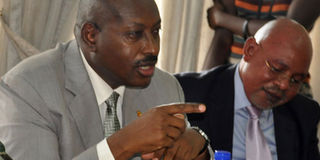Govt drafts new law to gag media

Attorney General Fred Ruhindi (Left).
What you need to know:
Draconian. Human rights lawyers reject the proposed amendment as “a recipe for dictatorship” and Opposition MPs vow to block the Bill
Kampala.
Attorney General Fred Ruhindi on Wednesday tabled a new Bill titled: The Uganda Communications (Amendment) Bill, 2016, that seeks to give the executive arm of government outright powers to control communications in any way the sector minister deems fit.
In a two-page Bill from Mr John Nasasira, the Minister for Information and Communication Technology(ICT), government wants to amend the 2013 law to remove the requirement for parliamentary approval of the regulations made by the minister under the law.
However, Opposition legislators, human rights activists and some media professionals have warned of “serious consequences” if Parliament surrenders its powers to the ICT minister.
In the draft Bill, government, however, singled out Section 93 (1) and (3) as “conflicting”.
Speaker Rebecca Kadaga forwarded the Bill to ICT committee for scrutiny. In the coming weeks, the ICT committee is expected to meet the sector minister and other stakeholders to get their views before submitting its report to Parliament. The committee findings will guide parliament on whether to accept or reject the Bill.
The Minister for the Presidency, Mr Frank Tumwebaze, on Wednesday defended the proposed amendment as “innocuous” and insisted that “as a country we are not even an inch in regulating social media yet it’s necessary for citizen protection and security.” The minister, however, said the threat the country faces today is “irresponsible speech” that borders on genocide promotion, all as a result of unregulated platforms.”
Explaining the alleged “contradiction” in the communications law, the government argument is that Section 93(1) provides that the minister may, after consultation with the Commission and with the approval of Parliament, by statutory instrument, make the regulations for the better carrying into effect provisions of the Act. And Section 93(3) provides that the regulations made shall be laid before Parliament.
The object of the Bill, according to Mr Nasasira’s document, is to amend the Uganda Communications Act, 2013, to remove the requirement for parliamentary approval of the regulations made by the minister under the Section 93(1). The two sector ministers were not available for comment.
Terego County MP Kassiano Wadri (FDC) asked people to rise up through their representatives in Parliament and block the proposed amendment in public interest.
“The decision to grab the power of Parliament is intended to instil fear in the population because President Museveni wants to be a big brother”. Mr Wadri warned that any attempts to curtail free speech pervade dictatorship.
Masaka Municipality MP Mathias Mpuuga (Independent) and other legislators also rebuked the amendment and warned that the proposed “legislation is bound to suffer executive tyranny without supervision”.
Dr Livingstone Sewanyana, the executive director of Foundation for Human Rights Initiative, and Dr Peter Mwesige, a co-founder and executive director of the African Centre for Media Excellence, voiced similar concerns and warned that taking away the powers of Parliament will be unconstitutional, wrong and borders on abuse.
Asked why government does not want Parliament to approve the regulations, Mr Tumwebaze said there is nowhere citizens have as much freedom to speak and even do so irresponsibly as Uganda.
Mr Tumwebaze explained that since 2004 when Ofcom published a UK code of practice for the self-regulation of new forms of content on mobiles, the British government has been filtering internet content and is strict on social media content. This, according to the minister, provided a means of classifying mobile internet content to enable consistency in filtering, adding that all major UK operators voluntarily filter content by default.
Citing Kampala Capital City Authority Act which allows the Minister for Kampala to make regulations for the elections of representatives of the professional bodies, Mr Tumwebaze said not all regulations require parliamentary approval.
However, Mr Wilfred Niwagaba (Ndorwa West MP), who is also a city lawyer, said: “Parliament initiated the principle of subjecting statutory instruments (regulations) to parliamentary scrutiny to avoid abuse by the executive of delegated legislation.
The reasons existed then and now are stronger in view of government’s clampdown on its critics and in view of the open abuse of basic human rights, adding that right thinking MPs must oppose the proposed amendment to the Act.
On February 18, the authorities blocked social media platforms and mobile money networks as voting in the general election got underway. The President and Uganda Communications Commission (UCC) later explained that access to social media platforms like WhatsApp and Facebook via mobile phones and the popular mobile money network had been temporarily blocked over “national security” concerns during the election period.




